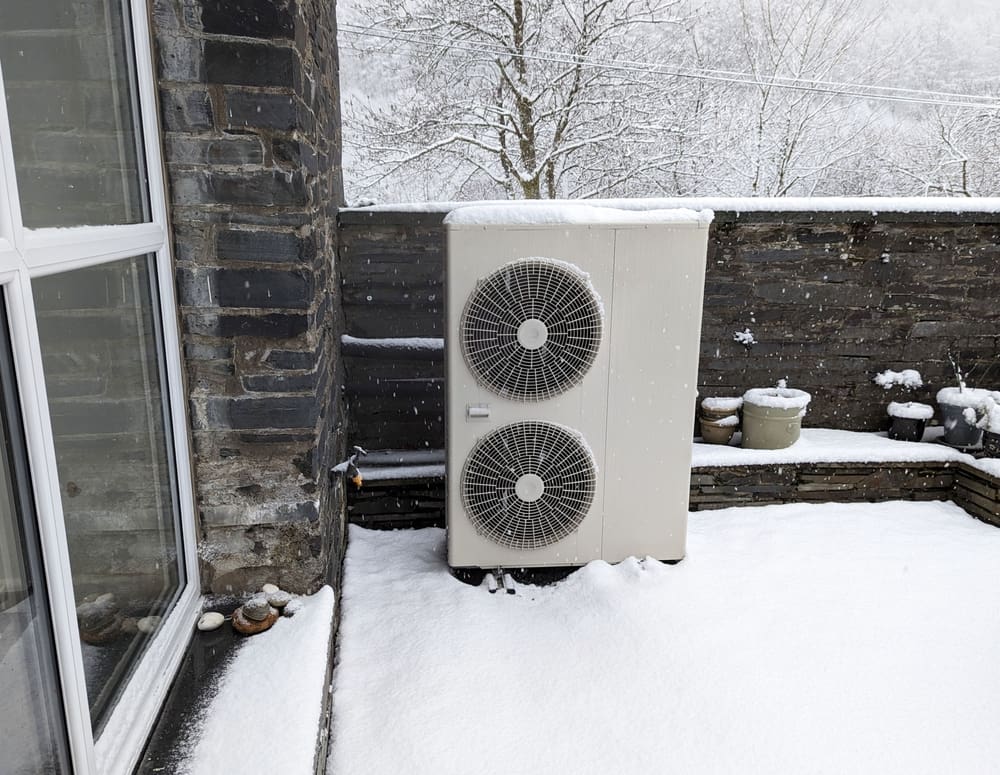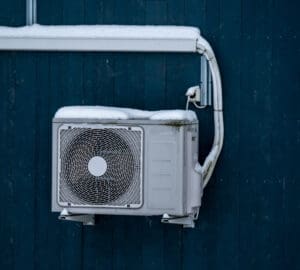
As New England’s fall fades, harsher winter weather has many homeowners wondering whether their heat pumps are up to the task. How do heat pumps work in winter? Can they effectively keep an entire home cozy enough to relax all winter long?
In this detailed guide, we’ll dive deeper into using heat pumps, operating them during the wintertime, and maximizing their performance. Hurley & David’s trustworthy heating repair services in Springfield, MA, can also unpack your specific heat pump’s capabilities and needs.
What Is a Heat Pump and How Does It Work?
A heat pump is an energy-efficient heating and cooling system that offers year-round comfort and convenience for your property. How do heat pumps work in winter? As in summer, your heat pump uses the outdoor air to warm or cool your home by exchanging heat and sending the unwanted air back out again.
The heat exchange process uses the pump’s coils, refrigerant, and reversing valve to direct heat where it needs to go based on the time of year. For example, in summer, your heat pump will work to send warm air out of your house, leaving your home cooler. It works the opposite way in winter.
How Do Heat Pumps Work in Cold Weather? 
Advancements in this heat pump technology have led to reliable cold climate units, but do heat pumps work in cold weather as effectively? Yes, heat pumps work in cold weather for heating as well as they work in hot weather for cooling.
With all the progress in the industry, this heating and air conditioning alternative is now highly accessible to property owners everywhere. However, they aren’t without problems. For example, some heat pumps will extract heat from the air to add warmth to a property in winter, so extreme cold or freezing conditions could pose a challenge.
Using supplemental heating options can improve the heat pump’s overall effectiveness at these times. That’s why some homes have dual-fuel systems that primarily use the heat pump but turn on an additional heat source if the pump can’t quite meet your heating demands.
Types of Heat Pumps
Choosing the right heat pump for your property size and family’s needs is key. If you’re looking at installation or replacement options, manufacturers have designed excellent heat pumps for cold climate performance, including air-source heat pumps.
Air-Source Heat Pumps
These popular heat pump models are affordable and energy-efficient. The pump contains a variable-speed compressor for temperature control in extremely cold conditions and a defrosting mechanism (good for colder climates).
Maximizing Heat Pump Performance During the Winter
How do heat pumps work in winter for maximum heating? If you’re new to running heat pumps in winter, here’s how to get the most out of your system and maximize its winter efficiency:
-
Don’t Cover Your Heat Pump With Anything
Do you cover your air conditioning system when not in use? Take a different approach when investing in a heat pump. These appliances operate all year and better avoid exterior damage, mold, mildew, and other issues if they’re in the open air.
-
Don’t Forget To Schedule Yearly Maintenance
Annual maintenance for all types of heating systems is crucial. For heat pumps, these tune-ups allow a technician to improve their performance and efficiency and make repairs. Your unit will last longer and be less likely to break down in the winter.
-
Do Replace Your Filters

Changing out dirty filters prevents any airflow restrictions and other problems for heat pumps during the wintertime. It also can improve your home’s indoor air quality, which is a huge plus for people who spend most of their time indoors because of the cold.
-
Don’t Use Emergency Heat Much
The only time you should consider switching to the unit’s emergency heating mode is when it is an emergency and you’ve exhausted all other options trying to stay warm. View it as a last resort mode for heat pumps in winter to avoid straining your system.
-
Don’t Program the Thermostat Too High
Many property owners make the mistake of sharply increasing temperatures in their homes, thinking it will get warmer faster. However, this decision only makes your system work harder and drives up consumption. If you have a smart thermostat working alongside your heat pump, let it work its magic instead.
-
Don’t Defrost Too Often
Cold climate heat pump operation includes a defrost setting to deal with frigid temperatures. You should only worry about using it if your unit runs frequently.
-
Don’t Forget To Dust Off Debris
Keeping the heat pump dust-free and away from debris will help it run smoother and avoid overheating. Maintaining heat pump components also keeps everything in top shape, no matter what type of climate you live in.
Schedule a Heating Service Near You
Heat pumps are excellent systems to keep properties comfortable during winter. How do heat pumps work in winter in Massachusetts? Hurley & David can answer your questions and help your home’s systems meet your heating needs in Springfield, MA, and surrounding areas.
Call (413) 200-4203 today or book a service appointment online to see why Hurley & David is one of Massachussett’s favorite HVAC teams.


